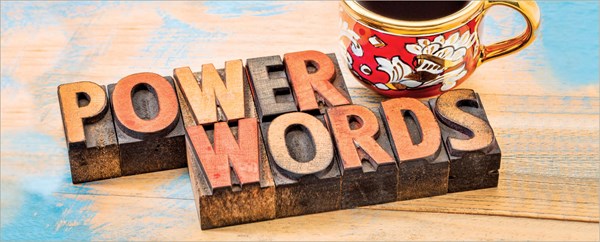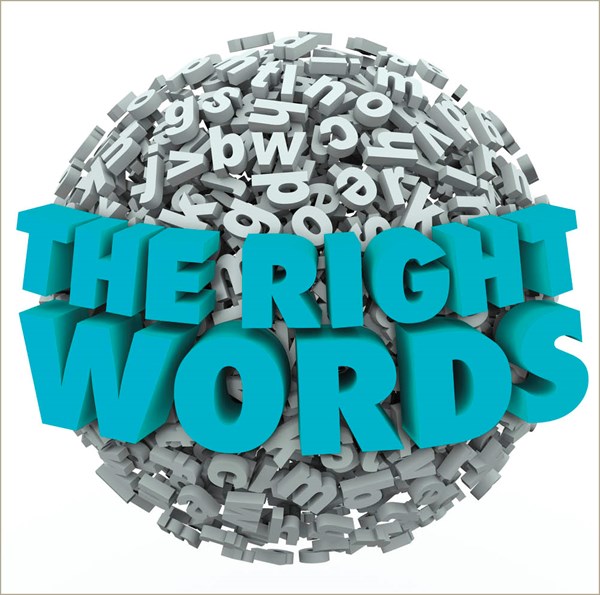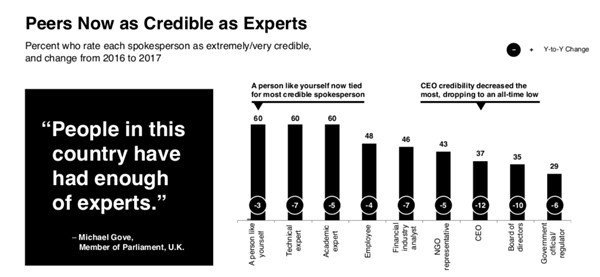4 Ways to Use Power Words to Supercharge Your Message
To supercharge your message, add power words. Power words enable you to capture attention, engage emotions, create curiosity, and seduce the senses of your audience. Just as magicians use magic words like abracadabra, marketers and communicators use power words to supercharge their messages.

By George Stenitzer
Chief Content Officer
Crystal Clear Communications
To supercharge your message, add power words. Power words enable you to capture attention, engage emotions, create curiosity, and seduce the senses of your audience.
Just as magicians use magic words like abracadabra, marketers and communicators use power words to supercharge their messages.
As Mark Twain said, the difference between the right word and the almost right word is the difference “between lightning and a lightning bug.”
What Are Power Words?
They’re the right words to help you get ahead and make your message stand out. They cut through to audiences because of how the human brain works. They’re clear and precise.

The right words, which the French call le mot juste, make all the difference.
The French call the right word le mot juste, translated variously as: to say it right, to make it clear, to choose the correct term, to use exactly the right word.
Power words are the right words, chosen to help you succeed. They capture people’s attention, engage their emotions, create burning curiosity, and seduce each of the 5 senses.
Power Words Capture People’s Attention
The most high-powered word is [your name here].
Names are powerful magnets for attention. Hearing your name lights up the brain’s middle frontal cortex, middle and superior temporal cortex, and cuneus, a study shows.
My name is George. Once I worked in an open office with an editor named George and a proofreader named Georgeanne. When anyone said “George,” all 3 of us looked up, every time. Even though we knew there were 2 more Georges in the room.
Use people’s names because it works. Personalize content with names. Connect with people by mentioning the names of people you know in common.
You. The second-best power word is a substitute for a name – you. Most content marketing is written in the second person – you.
Copy that’s irresistible is all about you.
Note: Copywriters sometimes substitute the word I for you in calls to action, such as a button that says, “I want it now.”
Free. How did the Internet seduce so much of people’s attention?
With a cornucopia of free things: free trials, free samples, free memberships, free shipping, and free gifts. Thanks to simple human greed, all things free have the power to turn heads.
New, now. Human brains sniff out novelty.
Words such as new, now, alert, introducing, announcing, finally, soon, immediately, and instant signal novelty.
Such words send an urgent telegram to the brain, prompting it to pay attention because something new is about to be revealed.
Because. Use the word because to answer people’s question why.
The word because works even if the reason behind it is weak, says a study by Ellen Langer, a Harvard psychology professor.
Langer’s experiments proved the importance because by testing 3 scenarios at a copier. When someone wanted to cut into the line to make copies, they made their request in one of 3 ways:
- “Excuse me, I have 5 pages. May I use the Xerox machine?”
- “Excuse me, I have 5 pages. May I use the Xerox machine, because I have to make copies?”
- “Excuse me, I have 5 pages. May I use the Xerox machine, because I’m in a rush?”
Which question worked best?
Only 60% of people said yes to the first question, which lacked the word because.
But 93% of people said yes to the second question, since it used the word because. Because triggers assent, even when the reason offered is weak. That is, everyone who’s in a copier queue needs to make copies.
And 94% of people said yes to the third question with the word because.
Use the word because to trigger compliance. Most people hear because and comply without listening closely to the reason that follows.

What people want to know most: how to information.
How to. People love seeking useful information, especially how-to information. Much of the Internet’s most valuable content is about how to succeed . . . at any endeavor.
For example, the most popular type of content among business-to-business buyers is prescriptive content. Some 97% of buyers want content that lays out a step-by-step formula for success, says the Demand Gen 2017 Content Preferences Survey Report.
When Jonah Berger studied which content becomes viral on the Internet, the usefulness of information was one key driver. By definition, how-to content is highly useful.
Power Words Engage People’s Emotions
Conventional wisdom says that bad news travels fast. But Berger’s study of viral content found otherwise.
Good news. Positive messages are shared more often in social media than negative messages. Good news beats bad news.
High-arousal emotions. The most-shared posts on social media engage high-arousal emotions such as anxiousness, anger, and awe.
People are less likely to share posts that engage low-arousal emotions such as sadness, Berger’s study says.
Appeal to basic emotions such as joy, trust, fear, surprise, greed, disgust, anger, anticipation, anxiety, and awe.
Fear. For example, the fear of missing out (FOMO) is what’s behind limited-time offers and scarcity headlines like, “Only 2 left at this price.”
Build fear with words such as agony, apocalypse, backlash, crisis, danger, hacked, looming, lurking, nightmare, pitfall, poison and suck.
Fear of social disapproval is behind the classic John Caples ad headline: “They Laughed When I Sat Down at the Piano But When I Began to Play!~”

People trust someone like themselves as much as they trust academic and technical experts.
Trust. People feel safe when they hear confirmation from people like themselves. Build trust through social proof such as ratings, rankings, awards, case histories, and testimonials.
The Edelman Trust Barometer study shows that people trust people like themselves as much as they trust academic and industry experts – and more than they trust CEOs.
Build trust with words such as authentic, best-selling, certified, guaranteed, money-back, no risk, proven, secure, and tested.
Awe. The feeling of admiration and elevation in the face of something greater then oneself – awe – is uniquely powerful. A sense of awe appears in words such as incredible, amazing, astonishing, breath-taking, and awesome.
What inspires awe? A story about someone who overcomes adversity. A new scientific discovery. A transcendent moment.
Awe works by opening the mind to previously unconsidered possibilities. Evoking a sense of awe is powerful enough to upend the status quo.
Awe and joy take the high road of human emotions. What about the low road?
7 deadly sins. On the low road of emotions are words that appeal to the 7 deadly sins: pride, gluttony, lust, greed, wrath, laziness, and envy.
Pride incents people to seek out experiences that mark them as smarter, richer, better or holier than others.
Flatter people. Appeal to their egos. “Join this exclusive club. Only 1 out of 10,000 people qualify.”
Pride and exclusivity are key to luxury brands. “Only 50 cases of this wine will be released.”
Greed drives people to seek free things, even things they wouldn’t want otherwise. Coupons and “50% off” or “buy one, get one free” offers feed on greed.
Greed drives headlines such as, “Warren Buffet has $1 million worth of advice for you.”
Stoke greed with words like bargain, cheap, extra, freebie, and prize.
Power Words Create Curiosity
Curiosity is sparked by an information gap, theorizes George Loewenstein at Carnegie Mellon University. When there’s a gap “between what we know and what we want to know,” curiosity arises.
Curiosity is the reason why game shows still captivate people.
People are most curious when they know a little bit about a subject, but not too much, says a study by Colin Camerer at Caltech.
Use curiosity-generating words such as backdoor, bootleg, confessions, covert, forbidden, insider, mystery, secret, and revealed. Generate curiosity with verbs like discover and find.

Questions make people lean into the conversation.
Questions. Spark people’s curiosity by posing a question. Questions stimulate people to lean in as they start thinking of potential answers.
Combine the power of a question with the word you to spark intense curiosity. People are twice as likely to click on a question headline with the word you than on a statement headline, found a BI Norwegian School of Business study.
Numbers. Create curiosity with headlines that include numbers, including list posts. List posts such as rankings, award-winners, or 10 reasons why spark curiosity. For example:
· “The top 10 money secrets of the ultra-rich”
· “The 100 best hospitals in the United States”
· “5 things to help you sleep better tonight.”
The most powerful number to use in headlines is 10, says a BuzzSumo study of 100 million headlines. Other powerful numbers include 5, 15 and 7.
To maximize the power of numbers in text, use numerals, not spelled-out numbers. Old-school copywriters advise using odd numbers rather than even numbers in headlines.
Imagine. To engage people’s imagination along with their curiosity, use the word imagine.
Imagine invites people to dream about what’s possible, even if it’s beyond anything they’ve experienced before.
“Imagine all the people, living life in peace,” John Lennon sang.
Power Words Seduce the Senses
Fiction writers use all 5 senses to help people place themselves inside the stories they tell. Use words and tell stories that engage people’s eyes, ears, nose, tongue, and fingertips.
“Imagine yourself on vacation at the beach in Hawaii, watching the swimmers, baking in the sun, clutching a cold Margarita, sipping slowly, listening to the waves wash in.”
Sensory words evoke a vivid response.
Write for the eye. As you help people imagine a place or a future state, focus on the sights they will see.
Describe the movements around them. People can’t resist looking at moving objects. Humans are hard-wired that way.
Write for the ear. Which sounds will your audience hear?
Birds singing in the trees? Bees buzzing around them? The honk of a horn calling them out of a deep reverie?
Writing for the ear also means taking advantage of certain techniques. Use rhythm, rhyme, and alliteration to make your words even more powerful and memorable.
Use power words that sound like what they are, such as splash, murmur, drizzle, mumble, and growl.
Write about smells and tastes. The nose and tongue combine in the closely related senses of smell and taste.
How does it smell when you put your nose next to a fresh flower? When the Thanksgiving turkey is roasting? When you bake cookies at home?
Smell and taste can also evoke disgust, a strong emotion. Doesn’t it smell awful when garbage has been rotting for weeks? When you drive by a dead skunk in the road?
Write about touch. The soft feel of a baby’s skin. The grit of sandpaper. The feel of olive oil on your fingertips. The jolt of static electricity shocking you.
Power Words Lift Your Message Above Others
Power words enable you to supercharge your message to break through in 4 specific ways:
- Capture people’s attention
- Engage people’s emotions
- Create the itch of curiosity
- Seduce the senses.
Get 10 Free Power Word Lists
Want more power words to work with? Here are links to 10 great lists of power words:
- Smart Blogger: 317 Power Words That’ll Instantly Make You a Better Writer
- Sumo: 401+ Ridiculously Useful Power Words to Increase Conversions
- Persuasion Revolution: 380 High-Emotion Words Guaranteed to Make You More Persuasive
- Buffer: 189 Powerful Words That Convert [Free List of Magnet Words]
- Social Media Today: The Big List of Power Words: 189 Phrases That Influence, Persuade, and Convert
- Optin Monster: 700+ Power Words That Will Boost Your Conversions
- Enchanting Marketing: 172+ Magic Words: How to Write Persuasive Business Content (As Proven By Science)
- CoSchedule: Free Download: 500+ Powerful Words for Writing Emotional Headlines.
- Visual Thesaurus: 104 Power Verbs
- Log-In Radius: The Ultimate List Of Power Words You Need To Hook Your Customers
Any power words you’d like to add?
Enough said!
Need more information?
By George Stenitzer, Chief Content Officer
Crystal Clear Communications
630-383-6047
About the Author
GEORGE STENITZER
George Stenitzer invents new answers for your marketing challenges. He brings decades of marketing and communications experience from S&P 500 companies – as vice president of marketing and communications at Tellabs, vice president of communications at RR Donnelley, and director of corporate positioning for Ameritech. The Content Marketing Institute named George Content Marketer of the Year for thought-provoking content, BtoB magazine twice named him a Best Marketer. He writes the Marketing Upside column for Global Telecoms Business and blogs weekly on B2B content marketing.
RELATED CONTENT
-
49 Years at Plastics Technology, and How I Lived to Tell About It
I didn’t know it then, but a couple of lucky chances landed me a career at a single magazine. But there’s more to a satisfying work life than just work.
-
Search Visibility: Get Your Content Noticed Online with This One Tactic
Discover how to generate more leads by including researched, relevant keywords in your content to attract interested prospects who are looking for you online.
-
Life On Deadline
EVP of Content and Web Kate Hand on building an unexpected career at a place that values balance.


